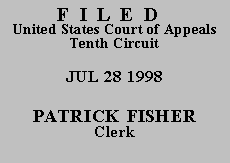

| PRINCE S.J. WEBBER,
vs.
U.S. DEPARTMENT OF DEFENSE;
UNITED STATES DEPARTMENT
OF THE ARMY; UNITED STATES
AIR FORCE; UNITED STATES AIR |
|
Mr. Webber objected to the magistrate's recommendation. He claims that the matter was not moot because prior to his transfer he received a greater amount of time based upon his tenure in a particular job. He contends that any reduction in the amount of extra good conduct time that he now earns is contrary to the prohibition on ex post facto laws recognized in Weaver v. Graham, 450 U.S. 24 (1981).
The record is clear that extra good conduct time is increased with tenure in a work assignment. See I R. doc. 24, exh. B & exh. B, attach. 2 (Army Reg. 190-47, ¶ 5-7(c)). Nothing in the regulation, however, suggests that tenure in a work assignment may not begin anew upon a transfer and subsequent work assignment. Cf. Sandin v. Conner, 515 U.S. 472, 478 (1995) (reaffirming lack of liberty interest in being free of prison transfers); Brown-Bey v. United States, 720 F.2d 467, 470 (7th Cir. 1983) (extending Olim v. Wakinekona, 461 U.S. 238 (1983), to federal prisoners). Indeed, transfer to another facility does not implicate the lack of notice that the ex post facto prohibition seeks to prevent. See Weaver, 450 U.S. at 30. The regulation provides between one and seven days of extra good conduct time per month; that Mr. Webber does not currently earn the six days per month (for assistant instructors and supervisor's assistants) that he did previously does not entitle him to relief on this record. See Hall v. Bellmon, 935 F.2d 1106, 1110 (10th Cir. 1991).
AFFIRMED.
Entered for the Court
Paul J. Kelly, Jr.
Circuit Judge
*. This order and judgment is not binding precedent, except under the doctrines of law of the case, res judicata, and collateral estoppel. This court generally disfavors the citation of orders and judgments; nevertheless, an order and judgment may be cited under the terms and conditions of 10th Cir. R. 36.3.
**. After examining the briefs and the appellate record, this three-judge panel has determined unanimously that oral argument would not be of material assistance in the determination of this appeal. See Fed. R. App. P. 34(a); 10th Cir. R. 34.1.9. The cause is therefore ordered submitted without oral argument.